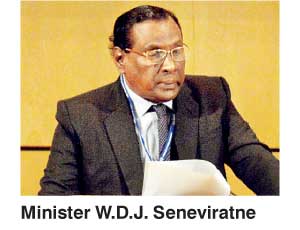Thursday Feb 19, 2026
Thursday Feb 19, 2026
Monday, 19 June 2017 00:09 - - {{hitsCtrl.values.hits}}
Following is the address by Minister of Labour and Trade Union Relations and Sabaragamu Development W.D.J. Seneviratne at the 106th Session of the International Labour Conference on 12 June in Geneva
 It is a great pleasure for me to address this June assembly of 106th session of the ILO on behalf of the Government of Sri Lanka as the Minister of Labour and Trade Union Relations.
It is a great pleasure for me to address this June assembly of 106th session of the ILO on behalf of the Government of Sri Lanka as the Minister of Labour and Trade Union Relations.
Reading the report of the Director General submitted to this session, titled ‘Work in a Changing Climate: The Green Initiative ’, I strongly feel that the Report is timely important as the world is facing numerous environmental challenges. It contributes to make a balance assessment of what the fight against climate change and highlights the potential for greening of production to be a powerful engine for creating decent jobs and balanced growth and development.
Mr. President, at this moment when I am addressing this assembly in Geneva, some of the people in my country are fighting to recover their lost livelihoods due to floods and landslides occurred in three weeks ago. Therefore, I wish to announce that Sri Lanka as an ILO member country will make every endeavour to be an active partner of the ILO in achieving the anticipated goals of the green initiative.
While submitting his Report, ILO Director General expects the ideas and views of tripartite constituents on how the ILO can contribute to the transition of world of work to environmental sustainability that will serve to advance both decent work opportunities for all and protection of the planet. I strongly believe that, ILO can support to make right policies at the country level engagements and take leadership in the global dialogue forums in the multilateral system in achieving the anticipated goals of the green initiative. However, it has to be mindful of how the global natural resources, energy resources in particular are being consumed by the people in the different parts of the world when such supports are provided to make right policies.
The ILO can also provide a platform for effective dialogue process encouraging more developed countries to convert their production technologies in to green technologies. The knowhow of such technologies should be transferred to the developing parts of the world in preventing and mitigating the impact of climate change while supporting to create significant additional green jobs. It is no doubt that ILO has strength and courage to take leadership in this process because of its tripartite structure.
Mr. President, Sri Lanka as a sending country of migration, acknowledges and appreciates the report submitted to the conference titled ‘Addressing governance challenges in a changing labour migration landscape’, I am happy to announce that Sri Lanka has significantly contributed to strengthen the governance of migration through number of measures taken at the national level, bilateral initiatives and Colombo Process and Abu Dhabi Dialogue at the regional level. Based on our experiences, we wish to be an active partner in ILO programmes and activities in addressing governance challenges of migration.
There is a standard setting item in the agenda of ILC as well. Setting standards is at the centre stage of ILO’s mandate in protecting and advancing the rights of the working people. However, I observe that the ratification rates in regard to some of the Conventions are very low. Therefore, it is high time to the ILO to gather information on the constraints for non-ratification and rethink the validity of such standards or to provide technical assistance to the countries to address the problems relating to non-ratification.
As far as Sri Lanka is concerned, I am happy to announce that we have ratified 43 ILO Conventions including all core Conventions. These include very recent ratifications of Seafarers Identity Document Convention No.185 and Maritime Labour Convention, 2006 as well. Further, the country is in the process of completing the ground work required to ratify Convention 155 on Occupational Safety and Health and Conventions 97 and 143 relating to migration. These developments and the progress made by the country in giving effect to the ILO Conventions with special reference to the freedom of association and collective bargaining, the remarkable progress made in combating child labour in particular, with the support of the ILO, contributed to regain the GSP+ benefit to Sri Lanka. In conclusion, therefore I wish to commend and appreciate all the support and cooperation of the ILO extended to us.
I herewith convey greetings of President of Sri Lanka Maithripala Sirisena wishing a successful and fruitful deliberations of 106th session of the ILO.
I thank you.